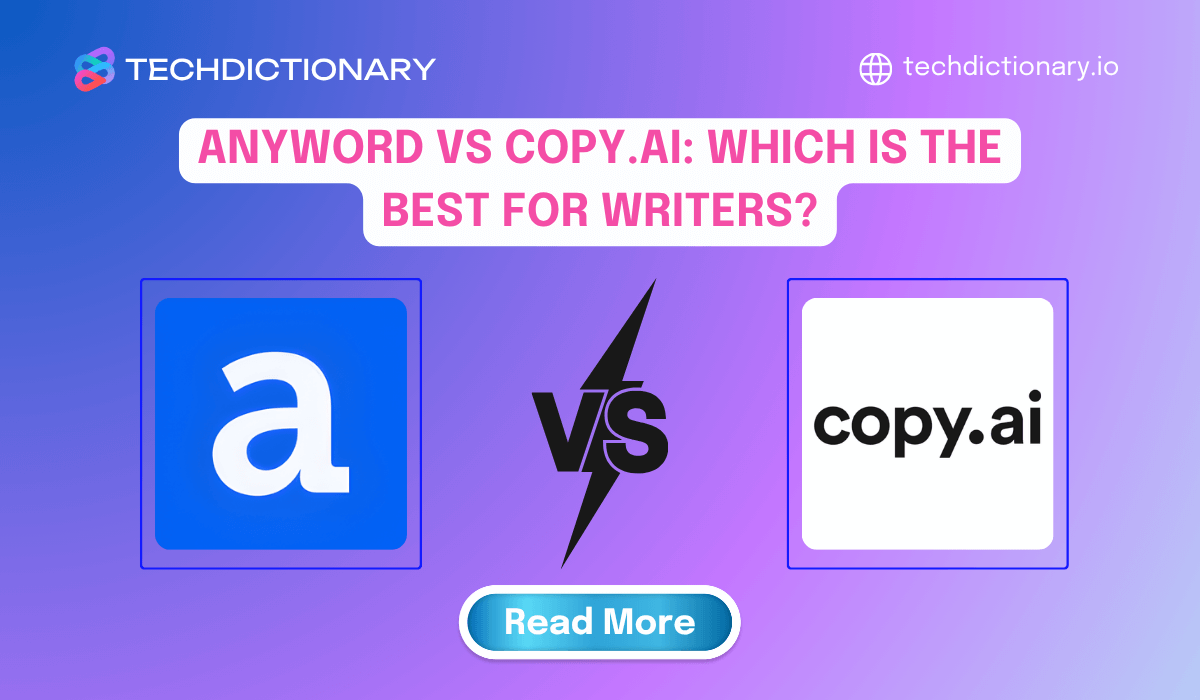
Our content team had a big debate last week. The topic? Anyword vs Copy.ai.
Half of us argued for Anyword. They loved that it’s like a data scientist, telling us exactly which words will get more conversions. The other half backed Copy.ai, calling it an automation powerhouse that saves us hours of repetitive work.
It was the classic battle: Better Performance (Anyword) vs. Faster Workflow (Copy.ai).
Tired of guessing, we spent a full week testing both on real freelance projects. We needed to find out which tool is actually worth our time and money.
Here’s what we found.
Before we dive deep, here’s the honest, fast-forward summary:
Bottom line: We feel Anyword is like hiring a data scientist who helps us perfect every ad. Copy.ai is like hiring an entire assembly line that automates 80% of our content process.
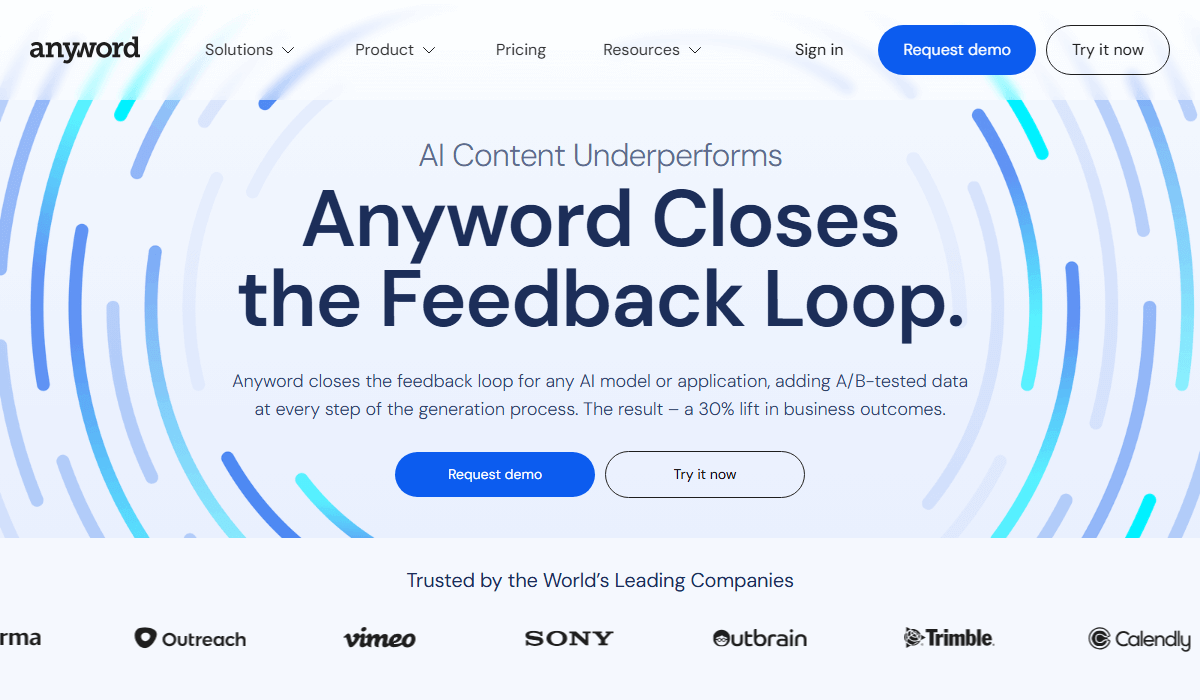
Anyword predicts content performance, not just writes
We quickly learned that calling Anyword just an “AI writer” is missing the point. Our team realized it’s a performance writing platform.
Its main job, as we discovered, isn’t just to write; it’s to predict how well our content will perform before we hit publish. We found it analyzes our copy against billions of marketing data points to give us a real-time performance score.
It felt less like a creative partner and more like a data scientist, built for marketers who obsess over ROI on ads, landing pages, and emails—where every word has to work.
You may be interested in: Anyword vs Writesonic: Which is the best for Writers in 2025?
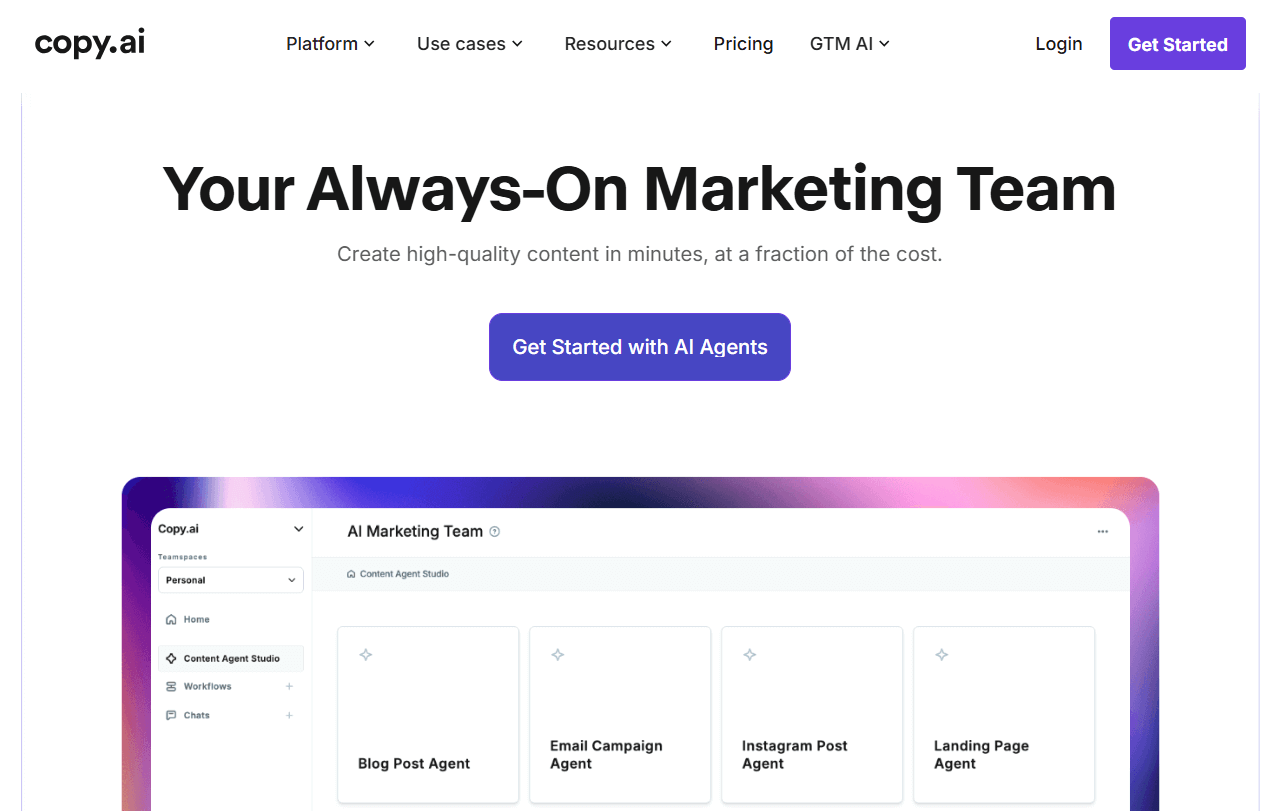
Copy.ai has evolved into an automation-focused GTM platform
Many of us on the team remembered Copy.ai as a simple writing tool from a few years ago.
But when we logged in for this test, we were shocked. It’s completely evolved into a GTM (Go-To-Market) platform (we even saw that it’s now used by over 17 million people).
The biggest change we found? It’s not just about writing anymore. It’s about workflow automation. It lets teams build automated processes, connects with over 2,000+ apps, and even gives us access to multiple AI models (like GPT-4 and Claude) in one interface. We quickly realized it’s built for teams who want to automate all the repetitive tasks around content creation.
OK, so that’s the overview. But how do they really compare?
We put them head-to-head in 6 key areas that matter to us as writers. Before we get into the full breakdown, here’s a quick summary of the results.
|
Feature |
Anyword | Copy.ai |
Winner |
| Versatility & Speed | Good, but limited by word counts | Excellent, offers unlimited words | Copy.ai |
| Brand Voice | Very detailed. Deep data & audience personas. | Fast setup, but more basic. | Anyword |
| Performance Analytics | Industry-Leading. This is its main job. | Not included | Anyword |
| AI Model Flexibility | Uses only its own AI model | Lets you choose (GPT-4, Claude 3…) | Copy.ai |
| Workflow Automation | Basic Marketing Integrations | Industry-Leading. (2,000+ apps) | Copy.ai |
| Ease of Use | Steeper learning curve (due to data) | Very intuitive, beginner-friendly | Copy.ai |
This was an easy win for Copy.ai. Right away, we noticed a huge difference in range.
We found that Anyword is highly tuned for short-form marketing copy—ads, landing pages, and email subjects. When we tried to make it write a long blog post, it just felt… wrong.
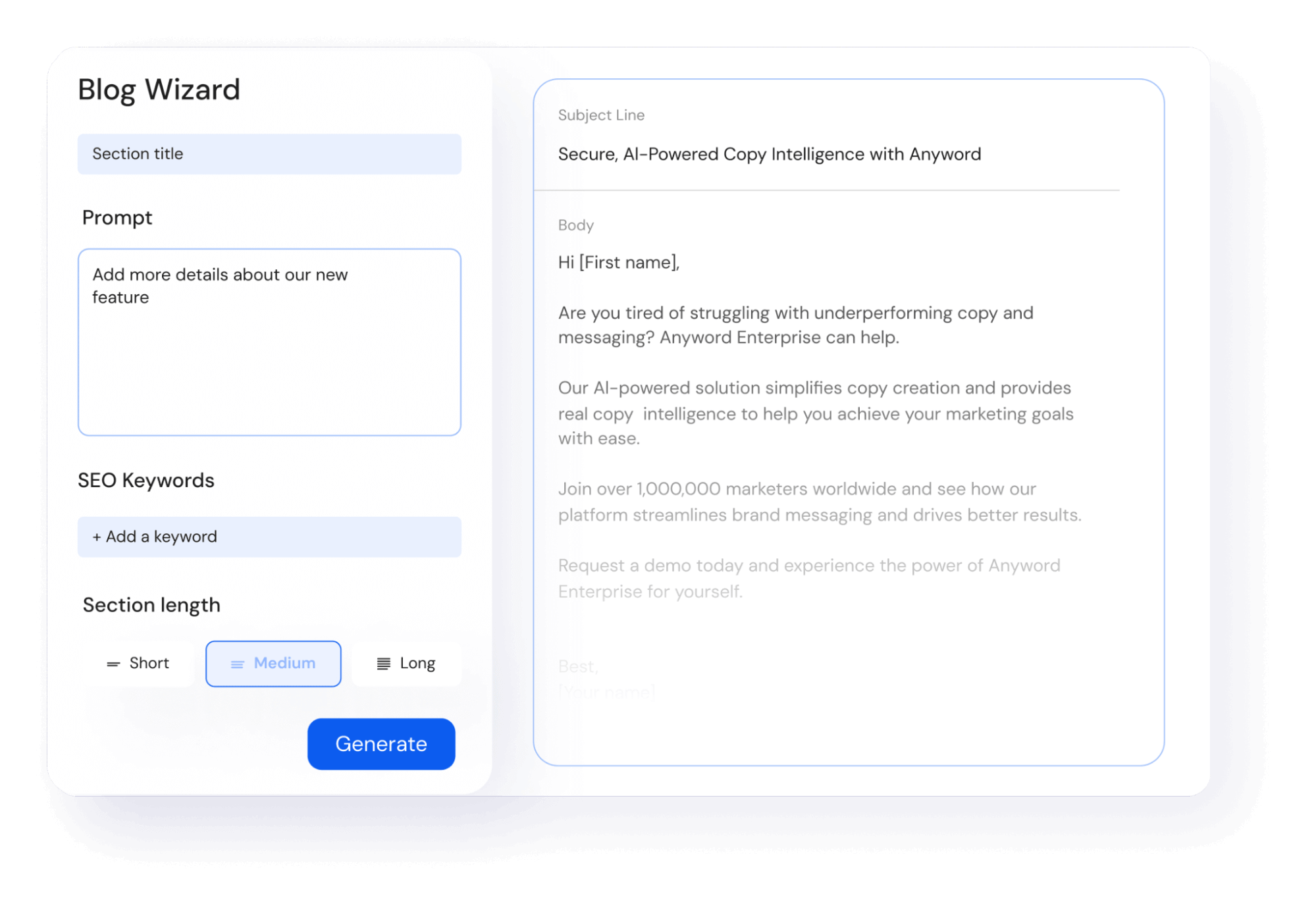
Anyword is optimized for short-form marketing copy
Copy.ai, on the other hand, handled everything we gave it. Our team’s “wow” moment was testing its “Blog Post Wizard.” We just gave it a title, and in a few minutes, it produced a full blog draft.
But the real deciding factor was the word limits. Anyword’s paid plans have strict word counts (e.g., 20,000-30,000 words), which puts our team in constant worry about “saving” words. In contrast, Copy.ai’s paid plans offer unlimited words. For a team that writes all day, this is a must-have
However, we did realize: what Anyword lacks in speed and volume, it makes up for in accuracy.

Copy.ai quickly creates full blog drafts with no word limits
For our team, Brand Voice is a very important feature. We were shocked to find that wy important feature. We were shocked to find that wthe two tools do it in very different ways.
Anyword’s way is very detailed. We gave it our website, and it built a “Brand Hub.” It learned our style and even our “words to avoid.”
But its best part is “Target Audiences.” This lets us create types of readers (like “Marketing Manager” or “Blogger”). Anyword then made us choose our reader and gave our writing a different score for each reader type. It wasn’t just our voice; it was our voice for a specific person.
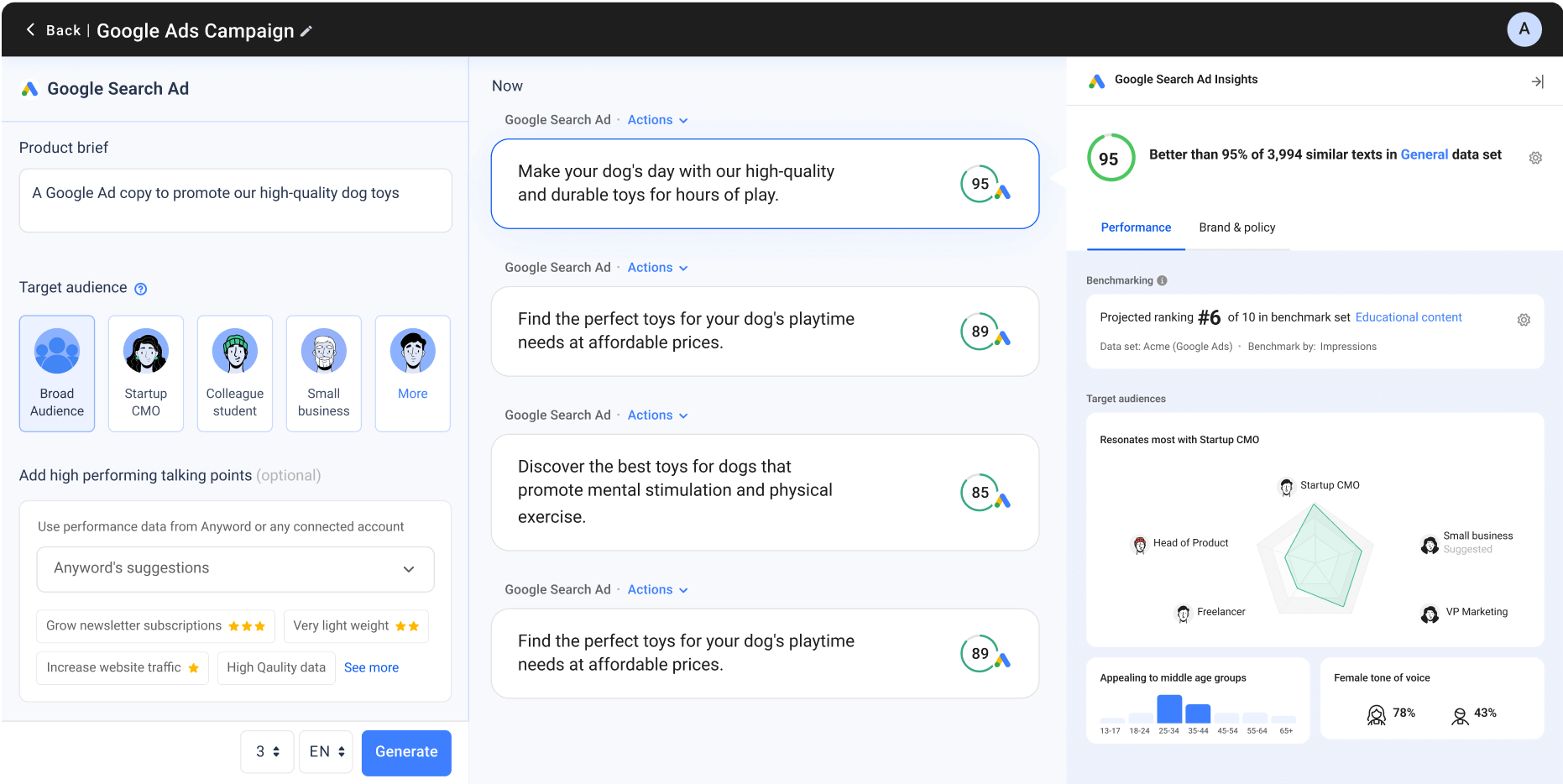
Anyword builds a detailed brand voice and audience targeting
Copy.ai is all about speed. We pasted a URL and got a new brand voice in 60 seconds. This was great for setting up 10 clients very fast.
The problem? It’s very basic. It gets the tone right (e.g., “playful,” “professional”) but misses the small things. We had to edit it a lot more for important clients.
Anyword wins for us. It fixes the harder problem: keeping our message right and matching it to the right person.
Winner: Anyword
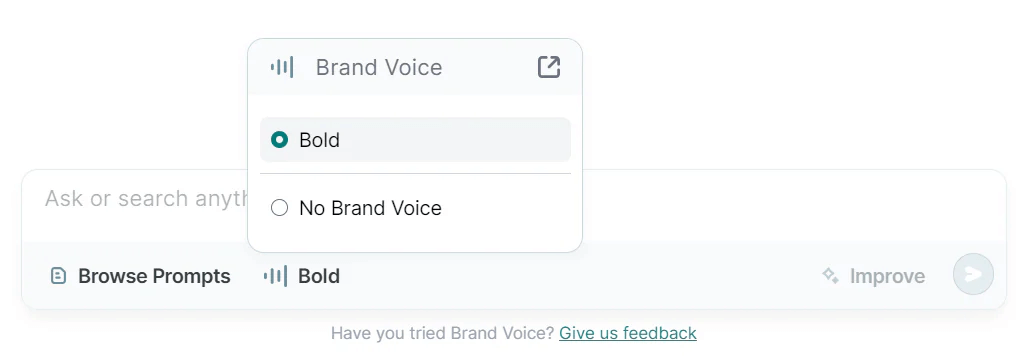
Copy.ai offers fast but basic brand voice creation
You may be interested in:
Anyword vs ChatGPT: Which is the best for Writers in 2025?
Copy.ai vs Writesonic (2025): Which is the best AI Writing Tool?
There’s really no comparison here. Performance analytics is the main reason Anyword exists. Anyword claims its predictions are up to 82% accurate in telling us which copy will perform best.
And suddenly, the feature made so much more sense to us. The Predictive Performance Score wasn’t just a general number. It was connected directly to the “Target Audience” we picked in the Brand Hub.
So, Anyword wasn’t just telling us, “This ad is an 8/10.” It told us, “This ad is an 8/10 for a “Marketing Manager”, but only a 3/10 for a “Solo Blogger”.
For people who focus on results, this is a dream feature. And it’s something Copy.ai doesn’t even try to do.
Winner: Anyword
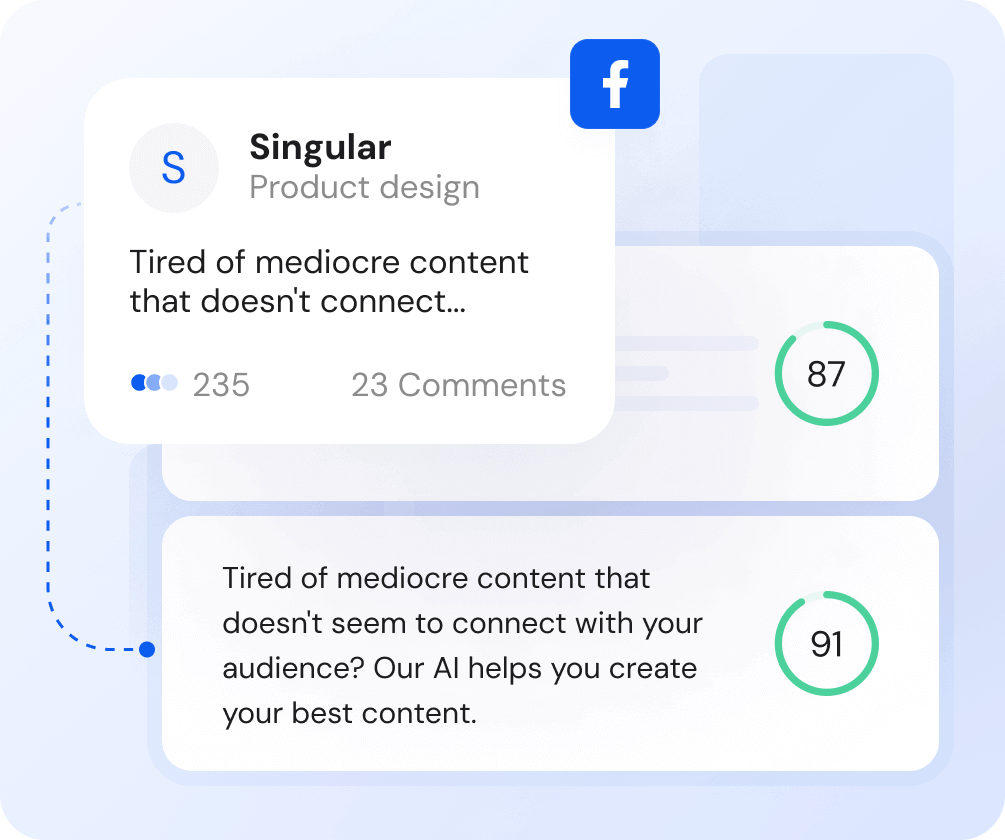
Anyword excels in performance analytics and prediction accuracy
As writers, we like having choices. And when it comes to choosing which AI model to use, Copy.ai gave us full control.
It lets us switch between multiple large language models (LLMs) right in the interface, including GPT-4, GPT-4o, and Claude 3.
We often find that GPT-4 is great for structured outlines, but Claude 3 is better for writing that sounds more natural and human. With Copy.ai, we could pick the best “brain” for the job.
Anyword uses its own powerful, proprietary model. It’s fine-tuned for marketing, but we couldn’t see how it worked inside, and we couldn’t choose another model. We simply got what it gave us.
Winner: Copy.ai
This part caused the most debate on our team, because how can there be a winner when their philosophies are completely different?
After we really tested both systems, we understood their approach.
We found Anyword focuses on Data Integration. It connects deeply with HubSpot, Google Ads, and Meta. But its purpose is to “Pull” performance data. It wants to know, “Which ad won?”. Then, it uses that data to train its AI, helping us write better content in the future. It’s a loop to optimize copy quality.
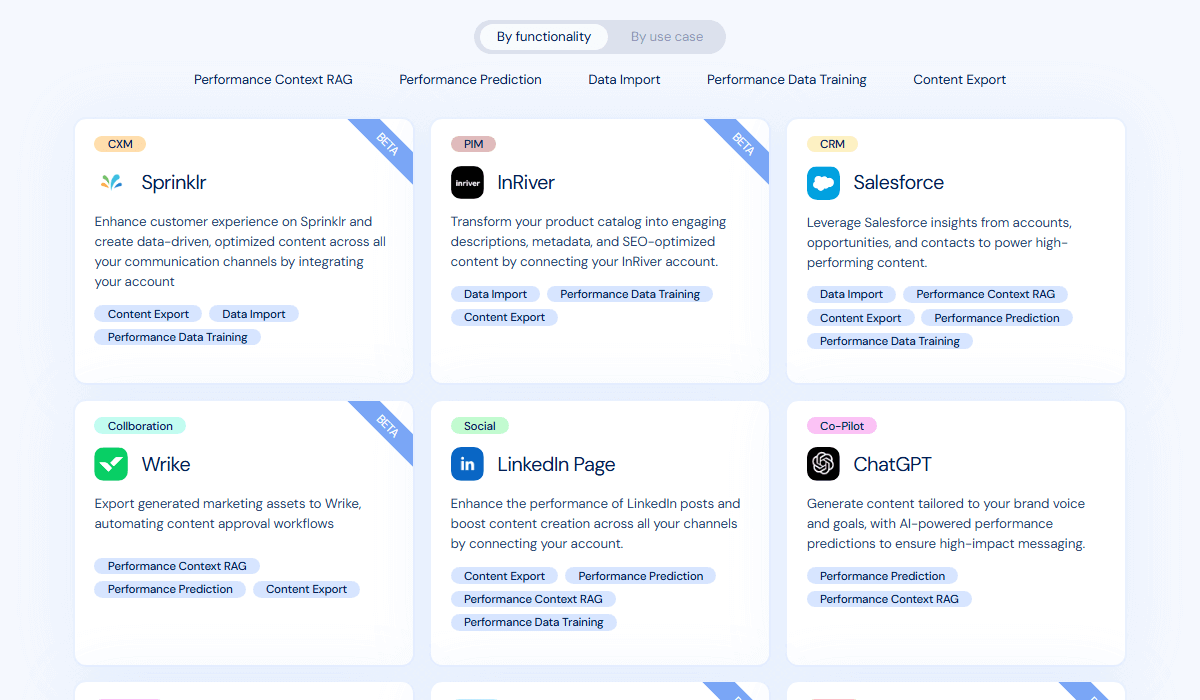
Anyword uses data integration to optimize copy performance
Copy.ai, on the other hand, is a true Process Automation machine. They call themselves a “GTM AI Platform” and have “Workflows,” “Agents,” and “Tables.”
Because this category is called “Automation,” we had to give the win to Copy.ai. The reason was proven by our team’s test. We tried a process:
All of that ran with one click. That’s not just an AI writer; that’s an automated content team.
Winner: Copy.ai
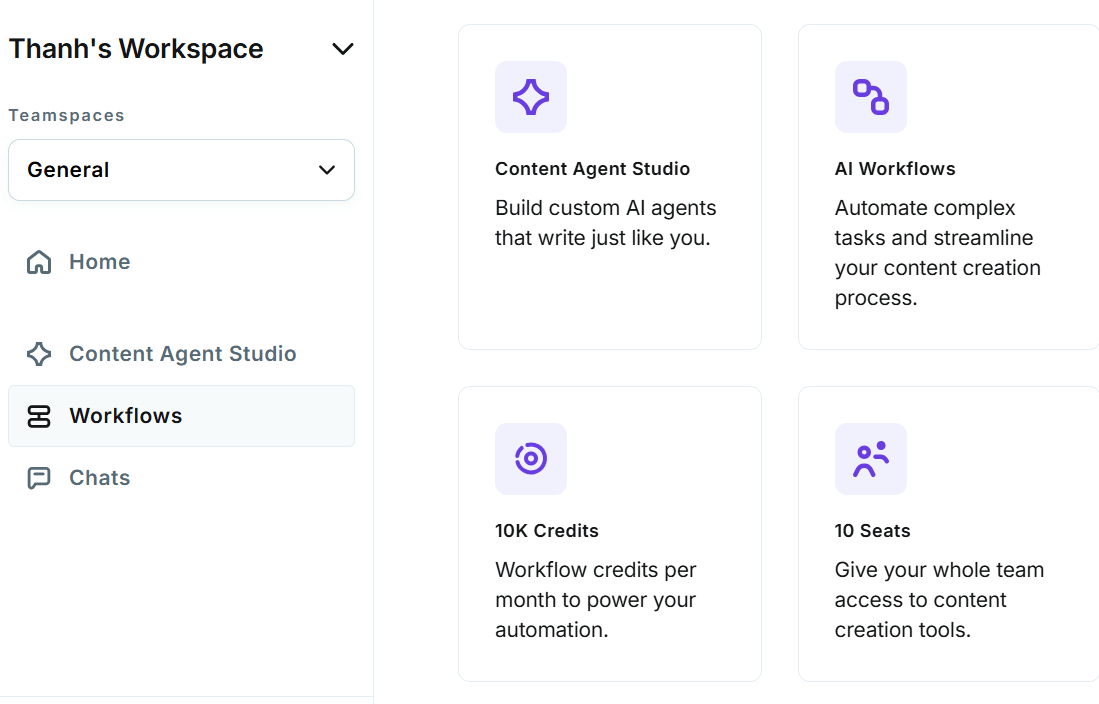
Copy.ai automates full content workflows with one click
Copy.ai was easier to use right away for us. Its chat interface looks just like ChatGPT, so our team felt at home in seconds.
Anyword’s interface is clean, but let’s be honest: it’s packed with information. We were immediately faced with scores, graphs, and “Target Audiences.”
When we opened Anyword, we felt like scientists who needed to analyze data. When we opened Copy.ai, we felt like creators ready to write.
Anyword is harder to learn, but we felt that was the price we had to pay for its powerful data.
Winner: Copy.ai
You may be interested in:
Jasper AI vs Copy AI (2025): Which is the best AI Writing Tool?
Copy AI vs Grammarly: Which is best for an AI Writing Tool?
| Anyword | Copy.ai | |
| Pros | ✅ 82% accurate performance prediction | ✅ Unlimited words on paid plans |
| ✅ Deep, persona-based brand voice | ✅ Powerful workflow automation | |
| ✅ Built-in A/B testing & analytics | ✅ 2,000+ integrations (Zapier, etc.) | |
| ✅ Best-in-class for ads & conversions | ✅ Flexibility to choose AI models (GPT, Claude) | |
| Cons | ❌ Word limits on all plans (a huge issue) | ❌ No performance or conversion analytics |
| ❌ Steeper learning curve (data-heavy) | ❌ Brand voice is fast but surface-level | |
| ❌ You can only use one AI model | ❌ Less focused on ad optimization |
Note: Pricing tiers change all the time, so we won’t list specific dollars. Instead, we’re focusing on the philosophy behind their plans—the things that really affected our wallets and workflow.
|
Anyword |
Copy.ai |
|
| Free Plan | No (Only a free trial) | No (Only a free trial) |
| Free Trial | Yes, 7-day free trial | Yes, a free trial is offered |
| Credit Card for Trial? | No (We love this) | No (We also love this) |
| Refund Policy | No refunds (Your plan runs to the end) | Yes, 5-day money-back guarantee |
| Lowest Paid Plan | $49/month (Starter plan) | $29/month (Chat plan) |
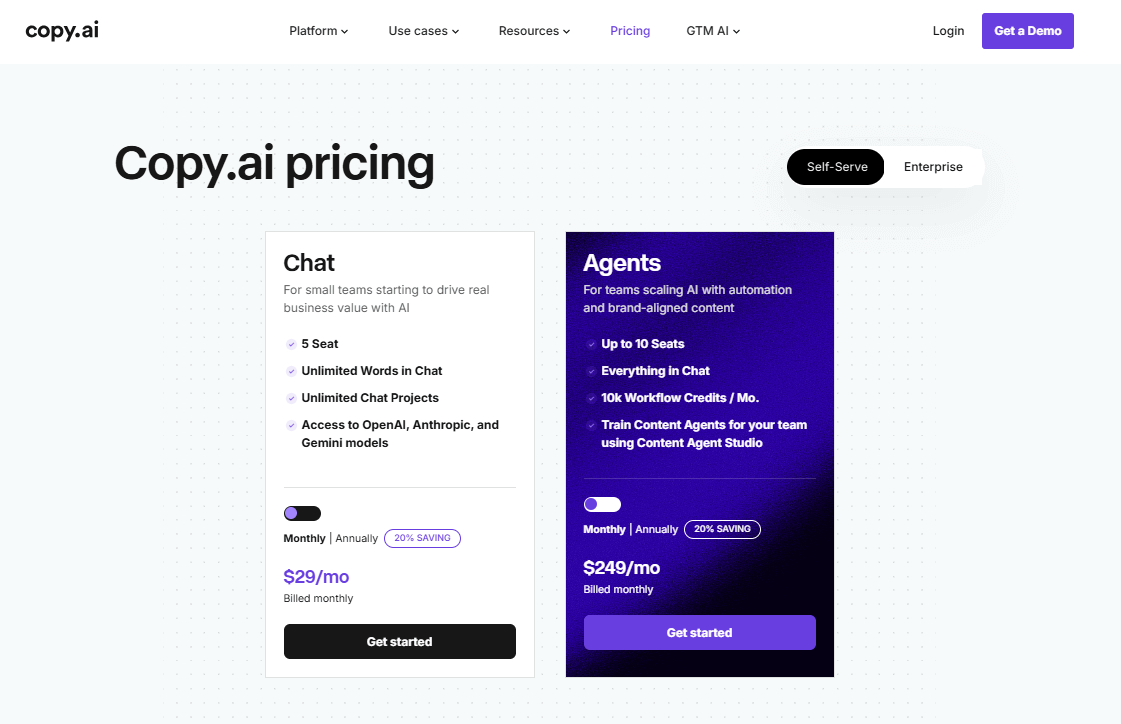
Copy.ai Pricing Plan
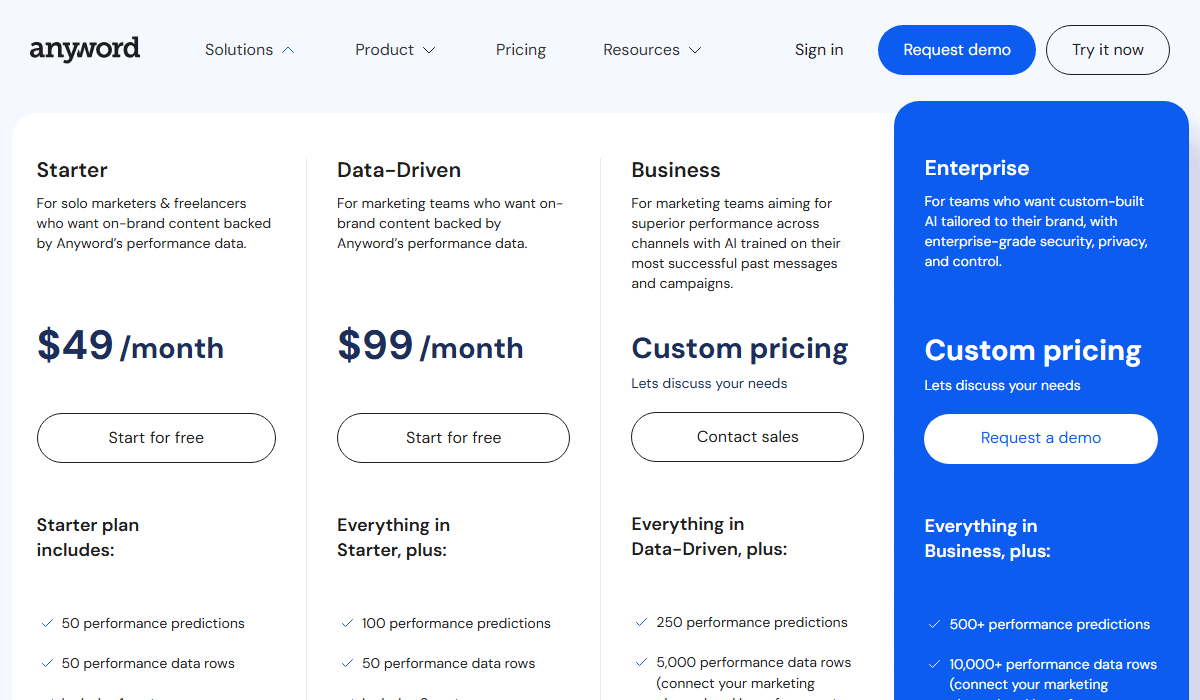
Anyword Pricing Plan
Key Insights from Our Team:
The “Unlimited” Catch: This was the biggest thing we found. Both tools offer “unlimited” writing, but they limit their most important feature.
How They Really Charge: Both tools charge a flat fee for basic writing, but they make you pay for their “golden feature.” Anyword makes money on predictions. Copy.ai makes money on automations.
Before our team could pick a winner, we had to be really honest. We realized the ‘best’ tool just depends on the answers to these key questions—the same ones we think every content team should ask.
Here are the critical factors we debated:
You may be interested in:
Copy AI vs Rytr (2025): Which Is Better for an AI Writing Assistant?
Copy AI vs Frase (2025): Which Is Better for Content Marketing?
In the end, our team agreed there’s no single “winner”. It’s not about which tool is better, but which tool is right for your specific job.
Choose Anyword if you’re:
Choose Copy.ai if you’re:
Our final tip: Don’t just take our word for it. We were able to test both tools completely risk-free without a credit card. We highly recommend you do the same. Try them both, and see which one feels right for your work.
You may be interested in:
Copy AI vs Quillbot (2025): Which Is Better for AI Writing Assistants?
Anyword vs Jasper: Which is the best for Writers in 2025?
Anyword vs Outranking: Which is the best for Writers in 2025?

